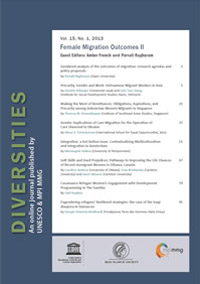Making the Most of Remittances: Obligations, Aspirations, and Precarity among Indonesian Women Migrants in Singapore
by Theresa W. Devasahayam (Institute of Southeast Asian Studies, Singapore)
This paper examines migrant women’s decisions around remittance expenditures. Going beyond the productive and non-productive framework used in previous analyses on remittances, the argument here is that migrant labour policies of the labour receiving country aside from migrant priorities need to be taken into account in understanding the kinds of consumption practices migrants and migrant households engage in. Ethnographic interviews with twenty-five Indonesian migrant women working in Singapore in the domestic work sector reveal that while women benefit greatly from migration because it enhances their ability to provide for their families back home, the paper shows that decisions on how remittances are spent are closely linked to the duration of employment abroad. During the time of their employment, these women are constantly reminded of their temporary and precarious work status. While working on several two-year contracts as a result of renewals have become the norm, migrant labour laws tend to place limits on their freedoms and by extension do not encourage these women to stay on. Thus, these women face a dilemma: the desire to continue to work abroad away from their families in order to increase their savings and investment prospects, while facing the uncertainty of whether they can stay in Singapore long term.
Suggested bibliographic reference for this article:
Devasahayam, T.W. (2013). Making the Most of Remittances: Obligations, Aspirations, and Precarity among Indonesian Women Migrants in Singapore. Diversities, 15(1), 21-36. Retrieved [todaysdate] from https://newdiversities.mmg.mpg.de/?page_id=1855
|
